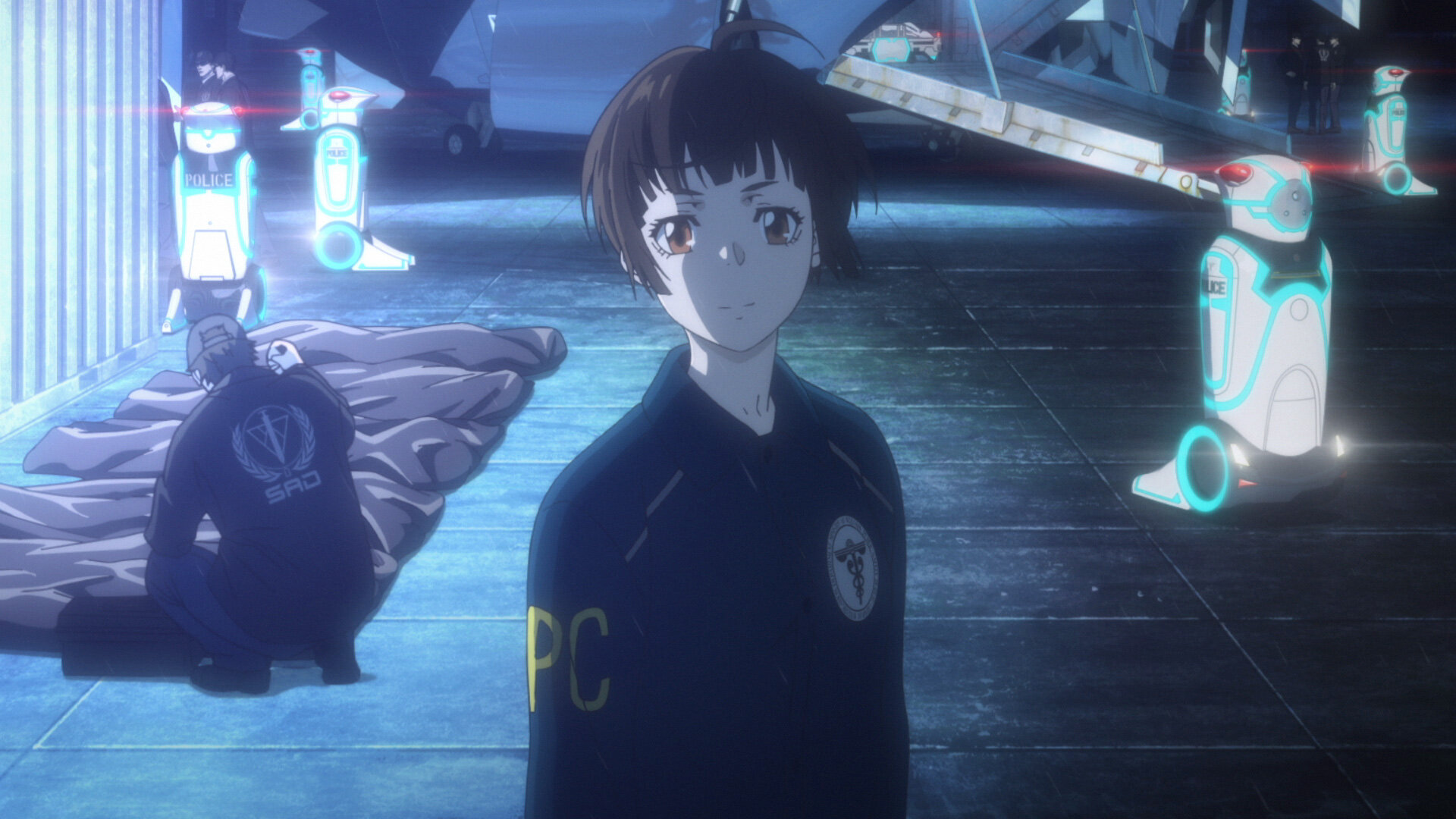PSYCHO-PASS: PROVIDENCE is a prequel to the third TV season and was produced concurrently, starting in 2016. The film is important because it reveals the main mystery of the third season, including Shuusei Kagari’s imprisonment, and explores the backgrounds of the main characters’ mentors.
Throughout its course, the PSYCHO-PASS series has challenged viewers to confront the core tensions between justice and law. In this film, the choice starkly crystallizes: Should society pursue perfect, AI-driven governance, or should it hold onto the fallible, yet persistently human, ideals of law?
Story Structure & Themes
The story of PSYCHO-PASS: PROVIDENCE has three big climactic moments: the battle at Dejima, the fight at the hideout, and the final showdown on the Northern Islands. Each scene raises the stakes, especially the Dejima battle, which focuses on the idea of ignoring justice and features the death of Professor Joji Saiga.
Anime ‘PSYCHO-PASS’ Series Official Website 10th Anniversary Project Launches October 2022! Production Confirmed for the Latest Film: ‘PSYCHO-PASS: PROVIDENCE’! Directed by Naoyoshi Shiotani, an original SF animation produced by Production I.G.
Akane Tsunemori is at the heart of the story, showing that law is an ongoing debate about good, evil, and justice. On the other hand, Tsugumasa Tonami seeks perfection from AI, which highlights the clash between human flaws and the strict demands of technology.
Visual Beauty and Direction Unique to the Theatrical Film
Production I.G brings the series’ serious tone to life with impressive visuals. The final battle over the Northern Islands stands out, with exciting aerial fights between fighter jets. From Sugou’s fighter activation to the fast-paced combat, the film offers a level of intensity that feels special on the big screen.

Meticulously detailed mecha and aerial combat are highlights of 『PSYCHO-PASS: PROVIDENCE』 Part 1 – Modeling & Crowd Expression. Introducing the making of 『PSYCHO-PASS: PROVIDENCE』.
Fans will be excited to see the Dominator’s transformation sequence return. Watching it change from black to bright blue is a standout moment. Other scenes, like Hanashiro using a giant Dominator for long-range attacks, are also memorable highlights.
The film features a close-up shot of the ventilation fan, a nod to Blade Runner from the first season, showcasing the director’s appreciation for classic films. Details like the blood turning red during the Chief’s shooting add layers to the visual storytelling and invite viewers to think more deeply.
The background art stands out with careful animation, showing everything from futuristic cities to the empty Scrap Zone. The way light and shadow are used matches the serious themes of the story.

After ten years of searching, Akane Tsunemori, the main character, finally finds her answer and her path in life.
This film showcases how Akane Tsunemori’s character has evolved over the course of more than ten years. Since the first season in 2012, she has always valued the spirit of the law. Now, she faces her biggest challenge: breaking the law to protect what it stands for. This is her way of finding an answer.
Her line, “I understand the Sibyl System’s usefulness. I just believe in something else,” crystallizes the decade of contemplation she has accumulated. For Akane Tsunemori, who has continually questioned what law is and what justice entails, this work represents both a culmination and a story that forces her to make the heaviest choice.
At first, it might seem like Akane is using the ‘any means necessary‘ approach she always disliked. But she hasn’t given up on her beliefs. Instead, she is asking her own unique questions about justice to protect the right to keep debating as a human. Kana Hanazawa’s performance effectively conveys this inner struggle, and the tears in the final scene reveal a great deal about the weight Akane carries.
Regarding her relationship with Shinya Kogami, the seemingly casual exchange over the phone—“I just wanted you to apologize”—conveys the depth of their bond. Furthermore, the final scene where Kogami tells her, “Cry your heart out,” is a memorable moment that highlights the very human qualities of the character Akane Tsunemori.
Homage to SF Classics and Series Lineage
This work strongly reflects influences from SF classics, such as Project Itoh’s The Killing Organ and Philip K. Dick’s Do Androids Dream of Electric Sheep?. The concept of the Conflict Coefficient, in particular, bears a strong resemblance to The Killing Organ. Religious themes are also skillfully woven into the narrative, such as the incorporation of the Christian motif of Paul’s conversion into the characterization of Tonami.
There are, however, a few problems. For example, the film doesn’t clearly show the seriousness of the threat posed by abolishing the law. The opening meeting scene doesn’t convey a sense of things being truly out of control, which makes Akari Tsunemori’s final decision less convincing.
Some parts, like why Professor Saika acted the way he did on Dejima and how he connects to Bifrost, feel unfinished as links to the third season. The film’s short runtime may be to blame, but clearer explanations would have helped viewers understand better.
The film is also tough for people who haven’t seen the series before. To really enjoy the story, you need to have watched at least the first and third seasons of the TV anime, which makes it hard for new fans to get into.
Summary: The Ongoing Question to Sibyl
PSYCHO-PASS: PROVIDENCE was a long-awaited masterpiece for series fans. The heavy price paid by one woman, Akane Tsunemori, to uphold her convictions leaves a profound resonance in the viewer. The main message of the film is that to remain human, we must continue to question and debate. As AI becomes more prevalent, the story reminds us to value our imperfect human choices instead of succumbing to perfect systems.
Can we truly relinquish our right to question and debate? In the end, the ‘spirit of the law’ that Akane Tsunemori wanted to protect might actually be human dignity itself.







